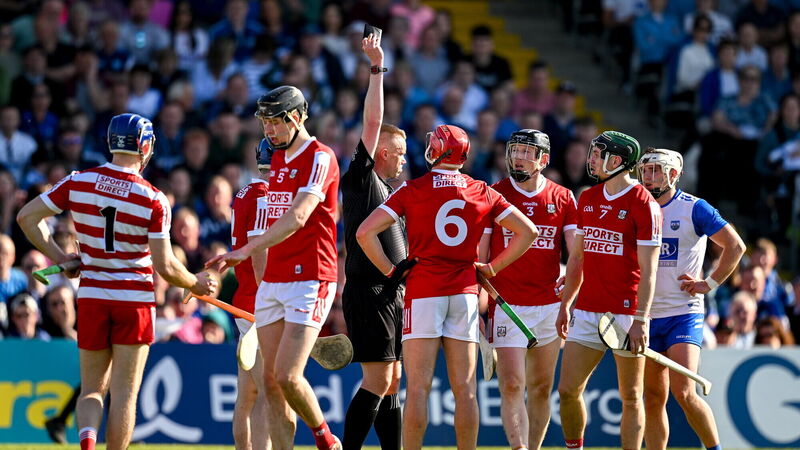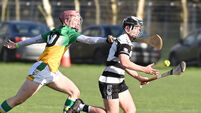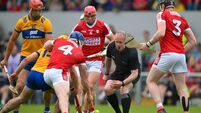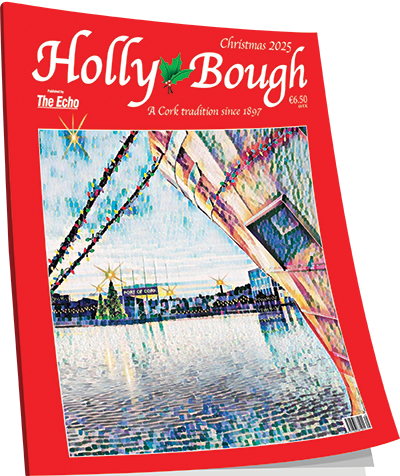Christy O'Connor on the rule changes can hurling take from football

Ciarán Joyce of Cork is shown a black card by referee Michael Kennedy against Waterford in 2024. Picture: Brendan Moran/Sportsfile
Maybe Jim Gavin and Éamonn Fitzmaurice were listening to Kieran Donaghy at the time. Maybe they weren’t.
Either way, the antennas of Gavin and the other members of the Football Review Committee were so receptive to positive change before they devised the new rules this year that they surely intercepted Donaghy’s comments as far back as 2023.
Back then, Donaghy suggested the implementation of the AFL’s 50-metre rule in Gaelic football to try and eliminate some of the indiscipline plaguing the game.
In the AFL, the 50-metre penalty gives referees the power to punish players for indiscipline and unsportsmanlike conduct, coming into play when certain infractions or time-wasting measures are deployed when a free-kick has already been awarded.
“Once you start punishing the scoreboard,” said Donaghy in 2023, “I think it cleans up everybody’s act pretty quickly.”
It certainly did this year. In the 2025 provincial and All-Ireland championship, there were just four players sent off over 99 games – two straight dismissals and two for second yellow card offences.
That’s a decline of eight red cards from the 2024 championship, which included 12 red cards and one investigation which led to a retrospective suspension. There was also a huge drop in yellow and black cards too.
The reduced numbers weren’t as stark in the league, but red cards were still down from last season, from 19 to 17. Straight reds were reduced from 14 to 10.
In contrast, there were 13 players dismissed in the hurling championship, 10 of them straight sendings-off - an increase of six from 2024. The numbers were also up in the league. In just two Division 1A games on the same day in early March, Cork v Clare and Kilkenny v Tipperary, seven players were red-carded.
Most of those straight reds were for striking with the hurley or head high tackles, but the GAA’s Hurling Development Committee (HDC) are recommending a similar dissent rule to football to try and clean up indiscipline; any player who displays dissent to the awarding of a free against his team will be punished more severely with a 30-metre advancement.
In football, dissent is penalised with a 50m advancement of the free up to the 13m line, which the opposing team can elect to kick from outside the 40m arc in an attempt to score two points.
The HDC did not think 50 metres was required because a 30-metre advance from most parts of a hurling field would put a free within striking distance of any modern-day free-taker.
For years, the hurling community has resented the notion that football rules could enhance hurling, primarily out of an inherent arrogance from a constituency who believed its game to be intrinsically fine, not to mention inherently superior.
Nobody could deny that hurling had an issue with cynicism too but hurling people also had to accept that the consequences of some of that cynicism stemmed from imported strategies from football and hurling’s increasing emphasis on possession play.
When a previous reincarnation of the FRC under the late Eugene McGee tried to deal with strategic fouling at the outset of 2013, especially around serial and repeat fouling outside the scoring zone, the FRC proposed a yellow card resulting in a player being substituted and excluded from the game. The eventual outcome was the introduction of the black card for the first time in 2014.
Did the black card work in football? Not to the level that it was hoped. Has the black card worked in hurling? No, primarily because the rule is so vague that it is almost unenforceable.
Firstly, the referee has to decide if a goal chance was prevented by the foul. Secondly, the regulation specifies that a player should not be considered to have a goal chance unless he is not only inside the 20 metre line but also further than 25 metres from the sideline.
The technical detail of what exactly constitutes “clear goalscoring opportunities” was always bound to cause confusion because there are so many grey areas around the topic of cynical play.
That application is harder again to classify when there are numerous different ways in which modern players are coached to commit fouls in goalscoring scenarios so as to ensure they don’t fall into the black card category.
At the outset of this year, the black card/sin-bin rule (for the cynical behaviour category) was first introduced at minor, U20 and Junior inter-county levels. A black card for Clare’s Jamie Moylan in the Munster U20 final in May was critical to the outcome of that game as Darragh McCarthy buried the penalty and Tipp outscored Clare by 2-3 to 0-0 during that 10-minute numerical advantage.
The black card though, is still not in club hurling. In Sars' recent Munster semi-final defeat, Ballygunner goalkeeper Stephen O’Keeffe committed a stonewall black-card offence when pulling back Barry O’Flynn just as he was about to strike the ball to the net.
With black cards so rare in the inter-county game, the GAA are reluctant to introduce them for club games, but that O’Flynn/O’Keeffe incident still underlines the anomaly around the ruling, especially for provincial and All-Ireland club games.
The black card has a different classification in football but one of the reasons for the reduction in black cards this year was the cultural shift forced by the new rules.
The introduction of a similar dissent penalty in hurling now won’t cure all the game's ills. Yet as football showed this year, reducing the potential for cynicism, and punishing it on the scoreboard by moving the ball forward, is a very positive means of changing any culture of indiscipline.
And better discipline means a better product.










 App?
App?










